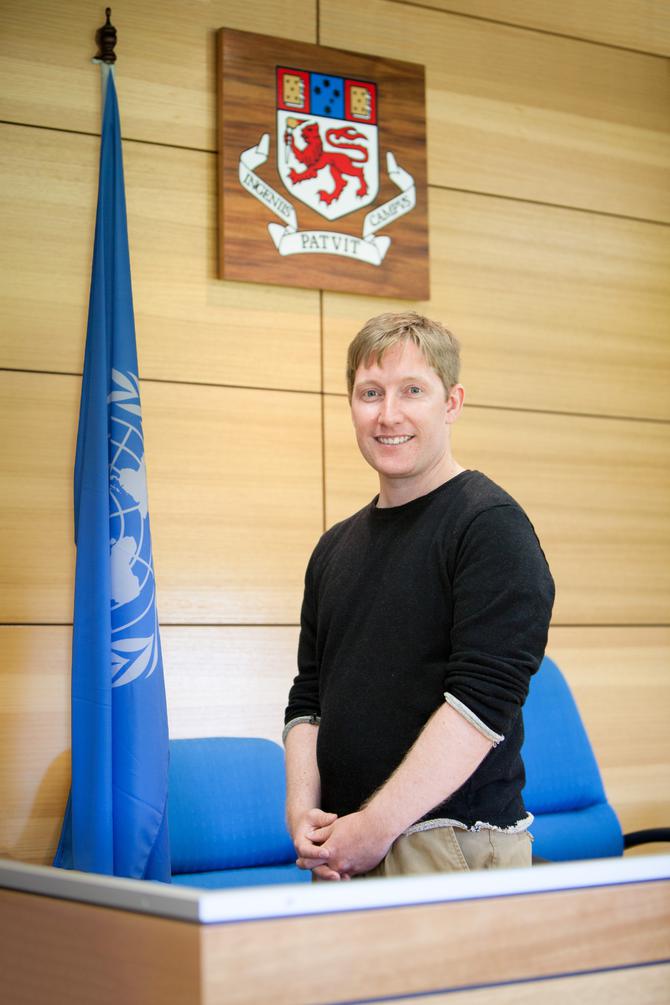Becoming a lawyer was what Lionel Nichols always wanted to do. He’s now a barrister in London, working for the biggest law firm in the world, practicing international and human rights law. He has prosecuted some of the biggest cases of our time including the blood diamond trial, the News of the World phone hacking case and the prosecution of Rolf Harris. And he says that he couldn’t have made a better decision than to study at the University of Tasmania.
One of the things that drove him throughout his studies was seeing the potential that law has to change people’s lives, to empower them, and to make a difference in the world.
Between 2001 and 2006 he studied a Bachelor of Arts majoring in Political Science and Philosophy, a Bachelor of Laws, which he completed with First Class Honours, and a Masters of International Politics.
I studied a lot of subjects in international law and international relations – it was what I was most interested in. It was clear to me that this was what I wanted to do with my life.
“I liked the idea of standing up and arguing something, that if something is unfair you can get the right outcome, that you can persuade people of different things.”
Lionel was awarded the Tim Hawkins Memorial Scholarship, which allowed him to go to The Hague, in the Netherlands, for six months. He worked at the War Crimes Tribunal for the Former Yugoslavia where he assisted in prosecuting people for war crimes and crimes against humanity, including the world’s most wanted fugitive at the time, Radovan Karodich.
The Hague is the centre for international law and has been for centuries. Anybody who is interested in international law will work at The Hague at some point in their life. For any young student it is the place to be, it’s where it’s all happening.
On the back of the Tim Hawkins Scholarship, Lionel was awarded the Rhodes Scholarship, which allows participants to study at the University of Oxford in the United Kingdom.
He studied at Oxford for four years, completing two Masters degrees in international law and human rights law, and a PhD.
It was at Oxford that Lionel met and worked with another Rhodes Scholar from Australia, Geoffrey Robertson QC, well known for defending Julian Assange in the WikiLeaks trial.
Together they worked on a number of international law and human rights cases over 3-4 years.
“We also looked into the possibility of prosecuting the Pope, for crimes against humanity, which ended up becoming a book called The Case of the Pope."
Lionel’s PhD at Oxford also became a book: The international criminal court and the end of impunity in Kenya.
“My PhD was about prosecuting the president of Kenya for crimes against humanity."
Lionel travelled to Kenya about 12 months after the 2007-2008 election crisis, living out of a backpack while he spoke with victims, judges, lawyers, and civil society.
"While I’ve contributed in small part to some really big cases, writing the book was something that was entirely me and I can be proud of the work that I’ve done.”

Lionel has worked on some of the biggest cases of our time in international and criminal law, including:
• The News of the World Phone Hacking Case
“It was tried at the Old Bailey, probably the most famous criminal court in the world, and described by The Guardian as being the case of the century. Almost every witness who came was a celebrity. The defendants themselves were household names. It was front page news every day that it was on.”
• The Rolf Harris Case
“I was involved in the prosecution.”
• The Blood Diamond Trial
“The president of Liberia, Charles Taylor, was the first head of state to be tried for crimes against humanity since world war two, so it was a big case internationally. Naomi Campbell was called as a witness in this case. Charles Taylor was convicted and sentenced to 50 years in prison, which he is serving at the moment."
“I’ve worked with victims of human rights abuses, people who have been the victims of war crimes, and crimes against humanity. Having the opportunity to help these people doesn’t feel like a job. It’s an honour to make such a difference in these people’s lives.”
Lionel said it was winning the Tim Hawkins scholarship from the University of Tasmania that was most influential in the trajectory of his career.
I couldn’t have made a better decision in choosing the University of Tasmania. There are lots of opportunities.
“I was nervous when I left RE how I would compete with my peers around Australia and the rest of the world. What I found was that I had no reason to be nervous. I had every reason to be confident. I learned everything I needed to know and I was able to apply those things right from the word go. I was able to make a meaningful contribution from the very first day that I walked into the courtroom.
“I wasn’t just photocopying or pushing papers around, I was able to engage in meaningful conversations with very intelligent people about some cutting-edge areas of the law, and have my opinion respected and sometimes even applied. And that felt pretty special to me to be such a young graduate but to be able to make such a contribution at such a young age."
